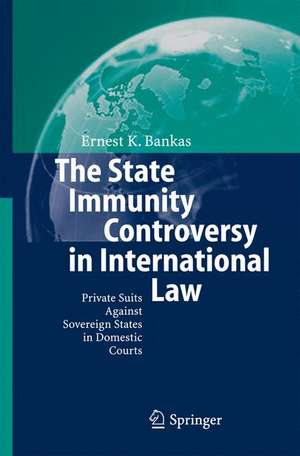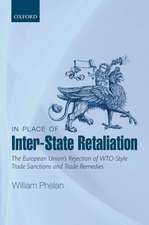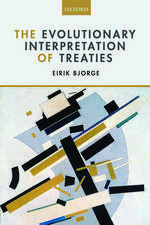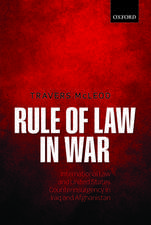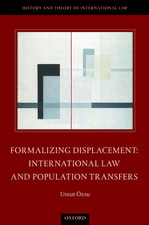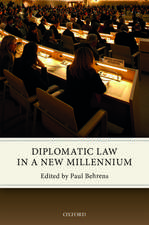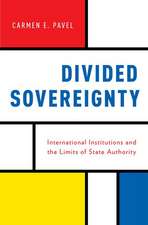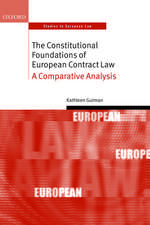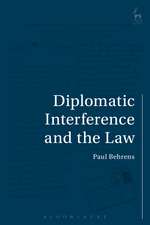The State Immunity Controversy in International Law: Private Suits Against Sovereign States in Domestic Courts
Autor Ernest K. Bankasen Limba Engleză Hardback – 29 iun 2005
| Toate formatele și edițiile | Preț | Express |
|---|---|---|
| Paperback (2) | 1355.14 lei 38-44 zile | |
| Springer Berlin, Heidelberg – 13 oct 2010 | 1355.14 lei 38-44 zile | |
| Springer Berlin, Heidelberg – 9 iun 2023 | 1572.57 lei 6-8 săpt. | |
| Hardback (2) | 1235.76 lei 6-8 săpt. | |
| Springer Berlin, Heidelberg – 29 iun 2005 | 1235.76 lei 6-8 săpt. | |
| Springer Berlin, Heidelberg – 8 iun 2022 | 1579.03 lei 6-8 săpt. |
Preț: 1235.76 lei
Preț vechi: 1507.01 lei
-18% Nou
Puncte Express: 1854
Preț estimativ în valută:
236.49€ • 256.79$ • 198.65£
236.49€ • 256.79$ • 198.65£
Carte tipărită la comandă
Livrare economică 22 aprilie-06 mai
Preluare comenzi: 021 569.72.76
Specificații
ISBN-13: 9783540256953
ISBN-10: 3540256954
Pagini: 564
Ilustrații: XVIII, 542 p.
Dimensiuni: 155 x 235 x 36 mm
Greutate: 0.96 kg
Ediția:2005
Editura: Springer Berlin, Heidelberg
Colecția Springer
Locul publicării:Berlin, Heidelberg, Germany
ISBN-10: 3540256954
Pagini: 564
Ilustrații: XVIII, 542 p.
Dimensiuni: 155 x 235 x 36 mm
Greutate: 0.96 kg
Ediția:2005
Editura: Springer Berlin, Heidelberg
Colecția Springer
Locul publicării:Berlin, Heidelberg, Germany
Public țintă
ResearchDescriere
The author shows through a careful analysis of the law that restrictive immunity does not have vox populi in developing countries, and that it lacks usus. He also argues that forum law, i.e. the lex fori is a creature of sovereignty and between equals before the law, only what is understood and acknowledged as law among states must be applied in as much as the international legal system is horizontal.
Furthermore, the state never acts as a juridical or natural person and, therefore, in logical terms, its functions cannot be divided into potere politico and persona civile, as a prelude to determine jurisdiction. The said Italian doctrine therefore is ex facie erroneous, and that a simple dichotomy between absolute immunity and restrictive immunity wholly predicated on the nature test alone would not be helpful in promoting justice. Hence, arbitration and comparative dominant theory are suggested instead in the resolution of this elusive problem.
Furthermore, the state never acts as a juridical or natural person and, therefore, in logical terms, its functions cannot be divided into potere politico and persona civile, as a prelude to determine jurisdiction. The said Italian doctrine therefore is ex facie erroneous, and that a simple dichotomy between absolute immunity and restrictive immunity wholly predicated on the nature test alone would not be helpful in promoting justice. Hence, arbitration and comparative dominant theory are suggested instead in the resolution of this elusive problem.
Cuprins
The Origins of Absolute Immunity of States.- The Development of Sovereign Immunity.- The Privileges and Immunities of States.- Restrictive Immunity in U.S. and U.K. Courts.- Private Suits Against African States in Foreign Courts.- African States and the Practice of State Immunity.- The ILC Report On Jurisdictional Immunities of States.- State Immunity and Certain Unresolved Problems.- State Immunity and Violation of International Law.- UN Draft Convention on State Immunity.- The Current Law of State Immunity.- Conclusion.
Caracteristici
Includes supplementary material: sn.pub/extras
Notă biografică
Dr Ernest K. Bankas is a legal scholar/Jurist Consult; Advocate on human rights and public international law.
- Education: BA Hons, LLB Hons, MA, LLM, LLM, SJD Law and PhD in law.
- PhD in public international law, Durham University 2000 UK.
- SJD in Conflict of LAWS, SMU, 1990, Law school, Dallas Texas.
- An expert in Public international law and Private international law.
- Holds an LLM in international Criminal law from Washington University USA.
- Awarded, Boutros Boutros Ghali, UN Scholarship to The Hague Academy of international law 1977.
- Worked with Rad Associates Law office 1991- 4.
- Visiting post-Doctoral Scholar, Durham University UK, 1995-2000.
- Editorial member of the International law journal (Cornell University 1994 USA).
- Testified as an expert before Federal District Court in Dallas Texas.
- Published an article on conflict of laws in the International Lawyer.
- Published two articles in the Durham student law review Known as Inter Alia.
- Published a Book on Public international law. The state immunity Controversy in international law 2005.
- Forthcoming second edition: The state immunity controversy in international law 2021.
- Associated with Swansea University, Wales UK.
- Education: BA Hons, LLB Hons, MA, LLM, LLM, SJD Law and PhD in law.
- PhD in public international law, Durham University 2000 UK.
- SJD in Conflict of LAWS, SMU, 1990, Law school, Dallas Texas.
- An expert in Public international law and Private international law.
- Holds an LLM in international Criminal law from Washington University USA.
- Awarded, Boutros Boutros Ghali, UN Scholarship to The Hague Academy of international law 1977.
- Worked with Rad Associates Law office 1991- 4.
- Visiting post-Doctoral Scholar, Durham University UK, 1995-2000.
- Editorial member of the International law journal (Cornell University 1994 USA).
- Testified as an expert before Federal District Court in Dallas Texas.
- Published an article on conflict of laws in the International Lawyer.
- Published two articles in the Durham student law review Known as Inter Alia.
- Published a Book on Public international law. The state immunity Controversy in international law 2005.
- Forthcoming second edition: The state immunity controversy in international law 2021.
- Associated with Swansea University, Wales UK.
Textul de pe ultima copertă
This book thoroughly discusses the concept of sovereign immunity in international law and how the problems normally associated with the said subject can be resolved in order to promote justice. In part one, the author shows through a careful analysis of the law that restrictive immunity does not have vox populi in developing countries and that it lacks usus. He also argues that forum law, i.e., the lex fori is a creature of sovereignty and between equals before the law, only what is understood and acknowledged as law among states must be applied in as much as the international legal system is horizontal.
Furthermore, the state never acts as a juridical or natural person and, therefore, in logical terms, its functions cannot be divided into potere politico and persona civile as a prelude to determine jurisdiction. The said Italian doctrine, therefore, is ex-facie erroneous, and that a simple dichotomy between absolute immunity and restrictive immunity wholly predicated on the nature test alone would not be helpful in promoting justice. Hence the contextual approach, arbitration and comparative dominant theory are suggested as essential tools to supplement the UN Treaty on state immunity when it comes into force because some states are likely to stay out of the said treaty regime.
In part two, of the book, the author provides a comprehensive analysis of international criminal justice i.e., the prosecution of heads of state before international tribunals and the means or tools available to defend these leaders. To that end, it is apposite that a distinction between immunity ratione personae and immunity ratione materiae be made clear, whereby emphasis must be placed on their differences and legal consequences in regard to the verticality of international tribunals and foreign criminal jurisdiction of states e.g., the ICC and SCLC.
The author further argues forcefully that the law has not changed and that despite the reforming zeal of some important states to change the law, in reality however, the law remains almost intact wholly structured on the presumption of immunity subject to certain limited acknowledged exceptions duly supported by opinio juris, thus eclipsing the suggestion by some scholars, senior courts and international tribunals that the law be instead based on an acknowledged exception to a presumed jurisdiction. This is because international law is a decentralized public order system without a compulsory jurisdiction.
Furthermore, the state never acts as a juridical or natural person and, therefore, in logical terms, its functions cannot be divided into potere politico and persona civile as a prelude to determine jurisdiction. The said Italian doctrine, therefore, is ex-facie erroneous, and that a simple dichotomy between absolute immunity and restrictive immunity wholly predicated on the nature test alone would not be helpful in promoting justice. Hence the contextual approach, arbitration and comparative dominant theory are suggested as essential tools to supplement the UN Treaty on state immunity when it comes into force because some states are likely to stay out of the said treaty regime.
In part two, of the book, the author provides a comprehensive analysis of international criminal justice i.e., the prosecution of heads of state before international tribunals and the means or tools available to defend these leaders. To that end, it is apposite that a distinction between immunity ratione personae and immunity ratione materiae be made clear, whereby emphasis must be placed on their differences and legal consequences in regard to the verticality of international tribunals and foreign criminal jurisdiction of states e.g., the ICC and SCLC.
The author further argues forcefully that the law has not changed and that despite the reforming zeal of some important states to change the law, in reality however, the law remains almost intact wholly structured on the presumption of immunity subject to certain limited acknowledged exceptions duly supported by opinio juris, thus eclipsing the suggestion by some scholars, senior courts and international tribunals that the law be instead based on an acknowledged exception to a presumed jurisdiction. This is because international law is a decentralized public order system without a compulsory jurisdiction.
